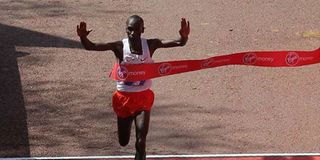Big city marathons: The real winners never run the races

Kenya's Eliud Kipchoge crosses the finish line to win the elite men's race of the London Marathon in central London on April 22, 2018. PHOTO | DANIEL LEAL-OLIVAS | AFP
What you need to know:
- You cannot follow the Tour de France then wonder why France has been the most-visited country in the world.
- Last week, we learnt that Premier League clubs reported record revenues of £4.5 billion in the 2016-17 season and also returned to profit.
Kenyan athletes dominated this year’s London Marathon, which was run at the weekend.
Eliud Kipchoge won his third title while Vivian Cheruiyot triumphed in the women’s race.
More than a day later, #LondonMarathon was still the top-trending Kenya topic on Twitter as Kipchoge and Cheruiyot were hailed, and Somali-Briton Mo Farah’s unsuccessful attempt to pull off an upset mocked.
Mo, however, notched up a British marathon record.
It was a very lucrative hunting day for the athletes with Kipchoge winning $55,000 (Sh5.5 million) for his labour and topping it with a rich bonus of $100,000 for crossing the finish line in a sub-2:05:00 time.
CASH PRIZES
Cheruiyot, on her part, picked up the $55,000 winner’s cheque and a bonus of $75,000 for recording a sub-2:20:00 time.
There is no honest day’s work in Kenya and its neighbourhood that would pay any man or woman anywhere near that kind of money.
In fact, it’s not easy either to steal that kind of money in a day.
The one question that never gets asked — as Kenyans and Ethiopians and the occasional Ugandan, Moroccan, Eritrean and other Africans go around the world winning these big moneys — is, “Why do they keep putting up these prizes for us to win?”
Part of the answer is to be found in the fact that these races are watched by so many people far away that they trend on social media.
ADVERTISERS
Because “our people” are running, and we are all watching, we create the massive number of eye balls that television broadcasters sell to advertisers.
For the advertisers, it is a huge global audience to market to. And for the cities that hold the marathons, it’s big business.
So, athletes like Kipchoge and Cheruiyot are not the winners; they are the product. The prize money they get are just pocket change.
The same thing can be seen, perhaps, even more dramatically in the (English) Premier League football.
Last week, we learnt that Premier League clubs reported record revenues of £4.5 billion in the 2016-17 season and also returned to profit.
Most dramatically, all the 20 clubs in the league made a profit!
SPORTS
One of the sources of the success of the Premier League is how well it has opened up to foreign players and exploited that to drive the fan base and business.
There are sports programmes dedicated to African players in the Premier League — with a BBC football prize to boot.
A creature arriving from Outer Space would be forgiven for thinking that the Premier League is an African league if it followed the sport through only African social media and sports media.
One of the most historically engaging sports one can follow on TV is the gruelling Tour de France — considered the mother of all bicycle races.
In the three weeks over which it is run, as it weaves through countryside, small and big towns, it is a constant flood of the histories and stories of the mountains, hills, small and big houses, museums, churches, rivers, gardens near where the race passes going back hundreds of years, and told with quite some colour. It’s impressive.
TOURISM
You cannot follow the Tour de France then wonder why, for many years, France has been the most-visited country in the world.
You watch the London, New York, Berlin, Boston and other marathons, and no effort is spared in spinning the tourist sites.
There would, probably, be less disruption running these marathons in the docks and industrial districts, but no.
There are no 750-year-old churches or art galleries there.
It seems, then, that while there are rich pickings in winning marathons and other sports, the really big bucks are in holding them.
In other words, sports is too serious a business to be left to sportsmen and women.
HOLIDAY
Consider this: A sports fan in South Africa with money in their pocket watched, and was awed by Kipchoge’s impressive victory at the weekend.
Later in the year, he is planning his holiday, and is given two choices based on his experience of the London marathon — to go and visit Kipchoge’s farm in the Rift Valley (which he wasn’t told about), or Windsor Castle, from where the Queen pushed the start button for the race (and was much gushed about).
Where do you think he will go?
Mr Onyango-Obbo is the publisher of Africa data journalism site Africapedia.com and explainer Roguechiefs.com. Twitter@cobbo3





